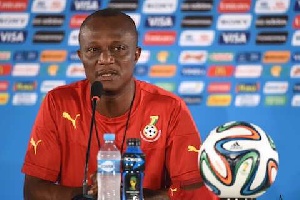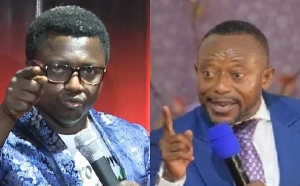- Home - Sports
- Soccer Portal
- Archived Sports News
- Sports Videos | TV
- Year In Review
- Sports Photos
- Sports Headlines
- Boxing
- Athletics
- Basketball
- Bodybuilding
- Cricket
- Golf
- Handball
- Hockey
- Martial Arts
- Tennis
- Volleyball
- Other Sports

Sports Features of Wednesday, 2 July 2014
Source: goal.com
Why Ghana must hold on to Kwesi Appiah
Ghana coach Kwesi Appiah might have several apologetics but this writer - who simply fails to comprehend why a man should be unduly given flak that doesn't belong to him - is hardly one of them.
Now, many are those calling for Appiah, who turned 54 on Monday, to step down from his role. In the opinions of these, the fall-out from Ghana's admittedly disastrous 2014 Fifa World Cup campaign betrayed Appiah as a clueless, spineless, and vengeful excuse of a manager.
Sorry, though, critics; the man is none of those. Instead, here's why Ghana need not get rid of Appiah just yet.
Slow learner, but a genius when he gets it
Remember that kid back in school who seldom gets lessons right the first time but scores top marks when he finally does? Well, in managerial circles, that's Kwesi Appiah.
Here's a man who failed to get a number of key selection and tactical decisions right in Ghana's Group G opener against the USA (even so, Ghana played much, much better) yet, when these flaws were made so glaringly obvious by Jurgen Klinsmann's superior approach, Appiah picked up the pieces, added the needed glue, and produced a sparkling performance in the next game against Germany.
A performance his opposite number on the day, World Cup bronze-winning coach Joachim Low, hailed and seemed occasionally unequal to. “We wanted to avoid it becoming too open a match... ," Low said afterwards.
Needless to say, Appiah's brilliance made it so. The German trainer continued: "After going in front [1-0] we wanted to stay compact, but then they scored two goals out of the blue. We wanted to force them higher up the pitch but they played well and always got back behind the ball very quickly."
Again, credit that to Appiah.
It wasn't just Low who applauded Appiah and his charges after that thoroughly thrilling 2-2 draw, though; the entire planet did, too.
Don't blame the concluding 2-1 loss wholly on Appiah either. If he was responsible, it was at least only partly so. Every other ounce of guilt ought to be shared equally between the feuding players and team officials. Really, there was very little he could get from a bunch of demotivated and distracted players against Portugal.
Whichever stories you opt to believe as the actual reasons for the dismissals of Sulley Muntari and Kevin-Prince Boateng from the Stars' camp, you really can excuse the confirmed aggression of neither player. Whatever might have prompted their reported foul speech and violent deeds, they did protest/act wrongly and, for that, Appiah's decision to axe both was commendable. It takes a man with lots of guts to dispose of perceivably disruptive elements in the middle of a World Cup campaign.
Fortunately or otherwise, Appiah proved that kind of man and, for those who have doubted his ability to rein in a bunch of players who earn much more in a year than he ever could in a lifetime, the former Asante Kotoko full-back had this message, particularly after Boateng's incident:
“When you deal with players you ignore them sometimes because you need them to perform but when it gets beyond the line you have to stamp your authority and let him know you are in control and that he cannot do things the way he wants, disrespect you and look down on you as if you are nothing.”
Given Appiah's naturally unruffled demeanour, the Schalke 04 star probably really did stray far 'beyond the line'. Righteous indignance, if you ask me.
The above notwithstanding, Appiah - per his stance during the impasse over unpaid sums that occurred between the players and the team's management/government officials - never was aloof nor insulated when his boys' argued what seemed a case logical enough to him. He threw his weight behind them when it mattered, if his public statements when what was rightfully due them seemed unusually delayed were anything to go by.
Caught in the middle as he was [between his superiors and subordinates], Appiah, when push ultimately came to shove, left no doubts as to where his allegiance really lay.
“No coach would like his players to worry about money before such an important World Cup match. I have had some sleepless nights,” Appiah said in defence of his players. “These things should have been taken care of before the competition.”
Perhaps, though, it was that - namely, being caught between the two groups that have reasonably suffered Ghanaians' wrath - which has proved Appiah’s undoing. On one hand, he is regarded as part of the GFA/MoYS allegedly money-plundering 'mafia', having been hired by that faction and, hence, his actions being considered sanctioned by his 'paymasters'. Alternatively, he is deemed by some as the mastermind of a failed expedition.
While both schools of thought do bear some truth deep within, neither is entirely accurate. Appiah, with all that happened above and beneath him in Brazil, was not allowed to be the chief protagonist he ought to have been.
He does deserve some blame, granted, but only slightly less than one-third of it.
Thus calls for him to resign - or be sacked, for that matter - are somewhat misplaced. He never enjoyed that relative peace of mind the likes of Stephen Keshi (coach of Nigeria) had to operate. With chaos all around him - throw in a measure of personal fallibility, if you wish - it is easy to see why Appiah failed to do his best work.
He was a victim of circumstances, yet with two more years to redeem himself, he could still show his worth.
Grant him a stay of execution, then. Let him be. At least for the time being.











